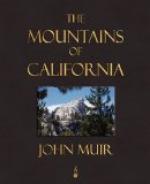and Clark crows, and perchance in a deer or bear,—after
the lapse of an hour or two vertical bars of sunshine
are seen ahead between the brown shafts of the pines,
showing that you are approaching an open space, and
then you suddenly emerge from the forest shadows upon
a delightful purple lawn lying smooth and free in
the light like a lake. This is a glacier meadow.
It is about a mile and a half long by a quarter of
a mile wide. The trees come pressing forward
all around in close serried ranks, planting their feet
exactly on its margin, and holding themselves erect,
strict and orderly like soldiers on parade; thus bounding
the meadow with exquisite precision, yet with free
curving lines such as Nature alone can draw.
With inexpressible delight you wade out into the grassy
sun-lake, feeling yourself contained in one of Nature’s
most sacred chambers, withdrawn from the sterner influences
of the mountains, secure from all intrusion, secure
from yourself, free in the universal beauty. And
notwithstanding the scene is so impressively spiritual,
and you seem dissolved in it, yet everything about
you is beating with warm, terrestrial, human love
and life delightfully substantial and familiar.
The resiny pines are types of health and steadfastness;
the robins feeding on the sod belong to the same species
you have known since childhood; and surely these daisies,
larkspurs, and goldenrods are the very friend-flowers
of the old home garden. Bees hum as in a harvest
noon, butterflies waver above the flowers, and like
them you lave in the vital sunshine, too richly and
homogeneously joy-filled to be capable of partial
thought. You are all eye, sifted through and through
with light and beauty. Sauntering along the brook
that meanders silently through the meadow from the
east, special flowers call you back to discriminating
consciousness. The sod comes curving down to the
water’s edge, forming bossy outswelling banks,
and in some places overlapping countersunk boulders
and forming bridges. Here you find mats of the
curious dwarf willow scarce an inch high, yet sending
up a multitude of gray silky catkins, illumined here
and there with, the purple cups and bells of bryanthus
and vaccinium.
Go where you may, you everywhere find the lawn divinely
beautiful, as if Nature had fingered and adjusted
every plant this very day. The floating grass
panicles are scarcely felt in brushing through their
midst, so flue are they, and none of the flowers have
tall or rigid stalks. In the brightest places
you find three species of gentians with different
shades of blue, daisies pure as the sky, silky leaved
ivesias with warm yellow flowers, several species
of orthocarpus with blunt, bossy spikes, red and purple
and yellow; the alpine goldenrod, pentstemon, and clover,
fragrant and honeyful, with their colors massed and
blended. Parting the grasses and looking more
closely you may trace the branching of their shining
stems, and note the marvelous beauty of their mist




